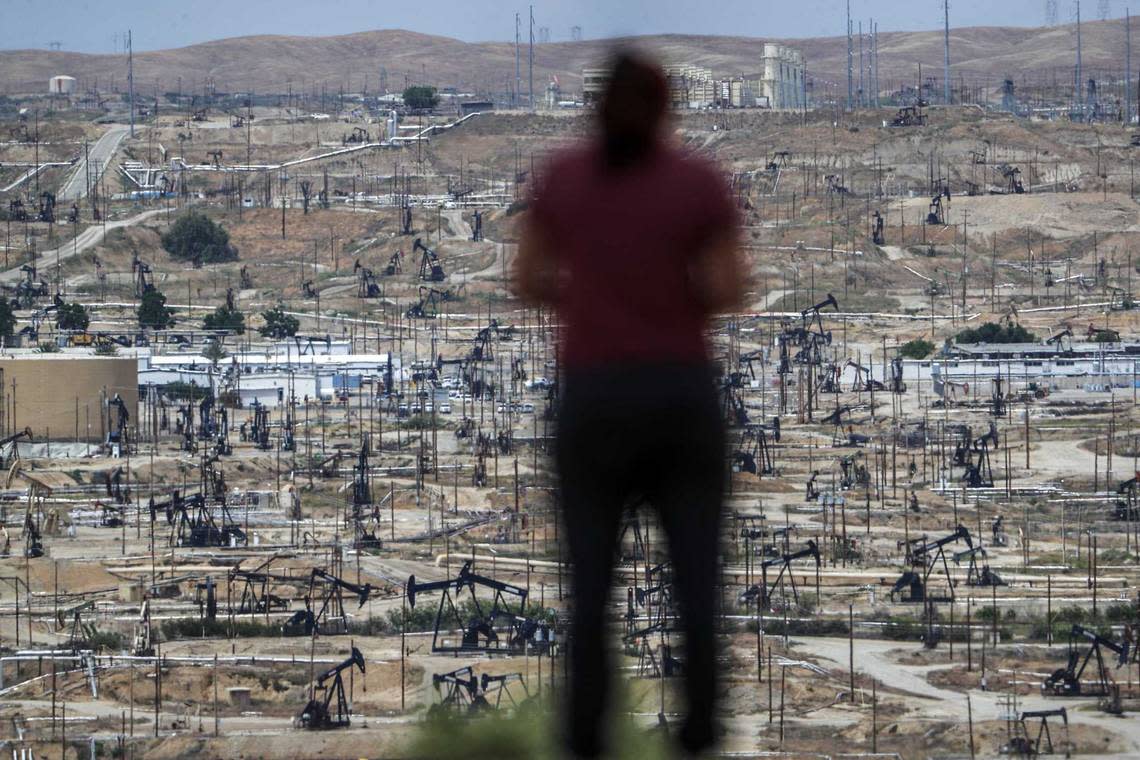California law restricting oil wells near homes to take effect after industry drops ballot challenge

A California law that severely restricts oil drilling within close proximity to homes, schools and businesses is set to take effect after an industry group said it would withdraw an expensive challenge to it on the November ballot.
The 2022 law, SB 1137, banned new oil wells and re-drills within 3,200 feet of homes, schools, businesses and other residential areas. The law never took effect once oil industry groups collected enough signatures to launch a ballot measure repeal.
The Thursday announcement by California Independent Petroleum Association (CIPA) ends a more than $20 million effort by industry groups to convince voters to overturn the law, arguing it encouraged dependence on foreign oil and would lead to higher gas prices and the loss of jobs.
CIPA chairman framed the move as a pivot in strategy, and plans to file a lawsuit asking a judge to block the law instead.
“Supporters of the energy shutdown can make unfounded claims in the press and in paid advertisements, but they can’t make those claims in court without evidence,” said chairman Jonathan Gregory in an announcement. “That’s why we are pivoting from the referendum to a legal strategy.”
Supporters of the original oil setback law passed two years ago characterized CIPA’s withdrawal as a major win and admission of defeat by the oil industry. The industry’s decision came after negotiations with a state lawmaker who introduced a bill that would severely penalize oil producers.
Gov. Gavin Newsom also backed an expensive, high-profile campaign to defend SB 1137. He was joined by celebrities such as former Gov. Arnold Schwarzenegger and Jane Fond, who argued for the need to cut pollution for communities living near active wells.
Newsom, which has made battling the oil industry a key policy position, called the news a major victory that “ends harmful drilling in our communities and enforces common-sense pollution controls” in a statement Thursday.
“Big Oil saw what they were up against — and they folded, again,” Newsom said. “No parent in their right mind would vote to allow drilling next to daycares and playgrounds. This is a huge win for all Californians, especially the two million living within a half-mile of these operations.”
Members of the state Legislature had long been applying pressure to the oil industry to withdraw the challenge. Assemblymember Isaac Bryan, D-Los Angeles, introduced a bill that would have fined oil companies $10,000 per day for low-production oil wells operating near homes and schools.
The Inglewood Oil Field, the largest urban oil field in the United States, is in his district. In an interview, Bryan said he negotiated with CIPA leadership to limit the scope of his bill to just Inglewood if they drop their measure from the ballot.
“We introduced this bill to force a conversation,” Bryan said. “I said I would amend it to impact only one operator. That was good enough for them to decide to drop the referendum.”
Bryan said he will continue negotiations with Inglewood Oil Field, which operates at least 400 wells, on the penalty cost for low-producing wells that leave the same environmental impacts.
“This was a multi-year effort. The campaign was of course a big component, Jane Fonda too and the unwillingness to touch the original law,” he said. “But it took a lot of work and conversations, it didn’t just happen.”
Members of the group opposing the oil industry ballot measure, a Campaign for a Safe and Healthy California, celebrated the news Wednesday night as a win for their campaign.
“Big Oil spent tens of millions of dollars trying to fool voters, using the profits made at the expense of community health, but it was no match for the groundswell of people power and community support we were able to unite all across California,” said director of Communities for a Better Environment Darryl Molina Sarmiento in a statement.
It’s not uncommon in California for companies to attempt referendums on laws affecting their industry in hopes that voters wipe laws off the books, or at least create delays for years until the law goes into effect.
Nearly 3 million Californians live within 3,200 feet of a working oil or gas well, largely in Kern and Los Angeles Counties. Medical research indicates that people living near wells are at higher risk for asthma, respiratory illness and some cancers.
The original law was a product years of campaigning by environmental justice advocates, who have highlighted that many of those living near oil facilities are people of color.
Those groups celebrated CIPA’s withdrawal of their ballot measure as a vindication of their activism.
“This is an incredible victory for the environmental justice communities that began organizing 20 years ago and built this campaign,” said Mabel Tsang, political director of the California Environmental Justice Alliance.
“We defeated them at their own game, playing by their own rules. So it’s an incredible moment not only for the people who live with oil drilling within their neighborhoods, but it’s an incredible indication of what’s possible.”


